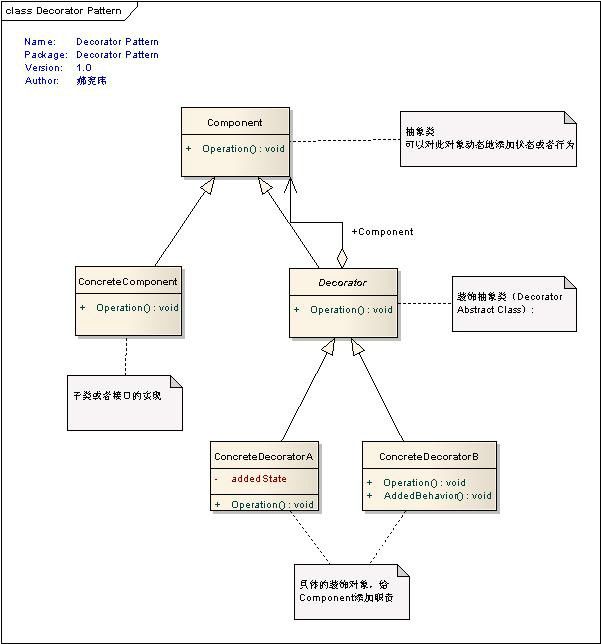装饰模式(Decorator)
定义
动态将职责附加到对象上,若要扩展功能,装饰者提供了比继承更具弹性的代替方案。
能够解决什么问题
已经开发完毕的对象,后期由于业务需要,对旧的对象需要扩展特别多的功能,这时候使用给对象动态地添加新的状态或者行为(即装饰模式)方法,而不是使用子类静态继承。
优点
把类中的装饰功能从类中搬移出去,这样可以简化原有的类。有效地把类的核心功能和装饰功能区分开了
模式结构
Component: 定义了一个对象接口,可以给这些对象动态地添加职责
ConcreteComponent:定义了一个具体的对象,可以给这个具体的对象添加职责(需要被装饰的对象)
Decorator:抽象装饰类,继承了Component对象接口,从外类扩展Component类的功能,但对于Component来说,是无需知道Decorator的存在
ConcreteDecoratorA:具体的装饰对象,起到给Component添加职责的功能
ConcreteDecoratorB:具体的装饰对象,起到给Component添加职责的功能
源代码
public interface Component {
void operator();
}
public class ConcreteComponent implements Component {
/**
* 装饰该方法,在此方法执行前后增加操作,前后操作可分离
*/
@Override
public void operator() {
System.out.println("被装饰的方法");
}
}
/**
* 装饰基类
*
*
*/
public abstract class Decorator implements Component {
//被装饰对象
protected Component component;
public Decorator(){
}
public Decorator(Component component){
System.out.println("装饰基类带参数构造函数");
this.component=component;
}
@Override
public void operator() {
//执行被装饰对象方法
component.operator();
}
public Component getComponent() {
return component;
}
public void setComponent(Component component) {
this.component = component;
}
}
public class ConcreteDecoratorA extends Decorator {
public ConcreteDecoratorA(){
}
/**
* 构造器的继承,子类始终调用父类的缺省构造函数
* @param component
*/
public ConcreteDecoratorA(Component component){
this.component=component;
}
@Override
public void operator() {
add_A();
super.operator();
}
public void add_A(){
System.out.println("=======装饰前========");
}
}
public class ConcreteDecoratorB extends Decorator{
public ConcreteDecoratorB(){
}
public ConcreteDecoratorB(Component component){
this.component=component;
}
@Override
public void operator() {
super.operator();
add_B();
}
public void add_B(){
System.out.println("=======装饰后========");
}
}
public class Client {
public static void main(String[] args) {
Decorator ca=new ConcreteDecoratorA();
Decorator cb=new ConcreteDecoratorB();
Component component=new ConcreteComponent();
//new ConcreteDecoratorA(new ConcreteDecoratorB(new ConcreteComponent()));
cb.setComponent(component);
ca.setComponent(cb);
ca.operator();
}
}
